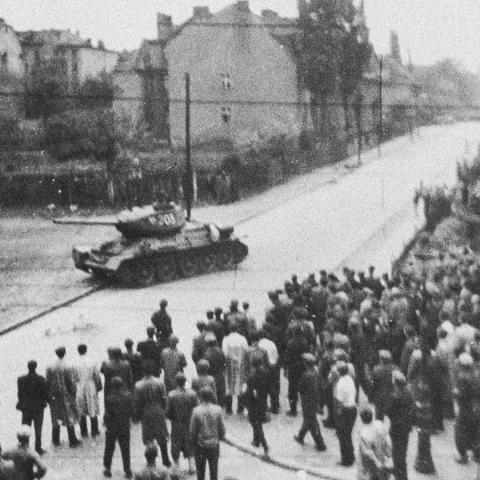
This year’s DOK Leipzig Retrospective titled “Film and Protest – Popular Uprisings in the Cold War” will explore the past by turning a spotlight on the cinematic testimony to resistance against Soviet regimes – a testimony that existed outside of the propagandistic self-portrayal of those in power. This programme, curated by Katharina Franck (Cinémathèque Leipzig) and Andreas Kötzing (Hannah Arendt Institute Dresden), focuses on films that documented the uprisings in various Eastern Bloc countries as they were happening, while bypassing the censors and defying political persecution.
These uprisings range from the East German protests of 17 June 1953 to the uprising in Budapest in 1956, to the Prague Spring, to the bloody struggles for independence in the Baltic states after 1990. At the same time, the retrospective also takes a look at lesser-known conflicts, including the mass protests in Poznan (1956) and the Polish workers' uprising of December 1970.
“The popular uprisings and quashed attempts at reform are a recurring theme throughout the Cold War period,” Andreas Kötzing points out. “When viewed as a whole, these films demonstrate that the protest movements were an enduring phenomenon in the Eastern Bloc – and that there were a wide variety of ways for filmmakers to portray them in film.”
The contents of the Retrospective range from subversive animated films to footage smuggled into Western countries to unusually candid films that could only be made as a result of a brief relaxation of censorship in Poland. “The courage of the filmmakers who took substantial risks, sometimes even risking their lives, with their covert footage or subversive productions resonates throughout the programme,” comments Katharina Franck. The programme also looks at the Western perspective on these developments in the Eastern Bloc, as reflected in the media at the time.
By staging this Retrospective, DOK Leipzig is also reflecting on its own controversial history. The growing influence of ideological guidelines on its programming meant that until the late 1980s, critical approaches to Soviet regimes were largely absent from the festival. This year’s programme includes some of the films that fell victim to (self-)censorship at the time, such as a Cuban newsreel by Santiago Álvarez (1968), in which Fidel Castro spoke critically of the Soviet invasion of Prague, and Bohdan Kosiński’s film about the “Birth of Solidarity” (1981), which was shown at Western festivals when it came out but was not invited to Leipzig.
The Retrospective at the 66th edition of DOK Leipzig will kick off with three short films from the period of upheaval from the late 1980s to the early 1990s. They will be shown free of charge at the main station on 9 October as part of the Leipzig Festival of Lights.
Two matinees tie in to the theme of the Retrospective. With the film “Woe to the Vanquished – The Workers’ Uprising, 17 June 1953” (1990) by Andrea Ritterbusch in the DEFA Matinee, DOK Leipzig is screening an impressive cinematic recreation of the popular uprising in the GDR which uses original footage from Western archives and interviews with eyewitnesses filmed directly after the fall of the Iron Curtain.
The Matinee Saxon State Archive will contribute to this multifaceted topic by reflecting critically on so-called “German-Soviet friendship” and its chequered history, which involved both fraternisation and glorification.
This year, the FilmFestival Cottbus (7–12 November) is also taking up the theme of resistance to communist regimes in the Eastern Bloc. A section titled “What Remains of History” is offering screenings of feature and documentary films on uprisings and opposition in the socialist GDR, Poland and Hungary. The programme includes films by Andrzej Wajda, Márta Mészáros, Andrea Ritterbusch and Volker Schlöndorff.
The Retrospective was produced in cooperation with the Cinémathèque Leipzig and the Hannah Arendt Institute for Totalitarianism Studies in Dresden.
DOK Leipzig would like to thank the Federal Foundation for the Study of the Communist Dictatorship in Eastern Germany, the DEFA Foundation and the Saxon State Archive for their funding and support of the film programmes.
The entire selection of films in the programmes profiled here can be found in the PDF file of the press release (see above).